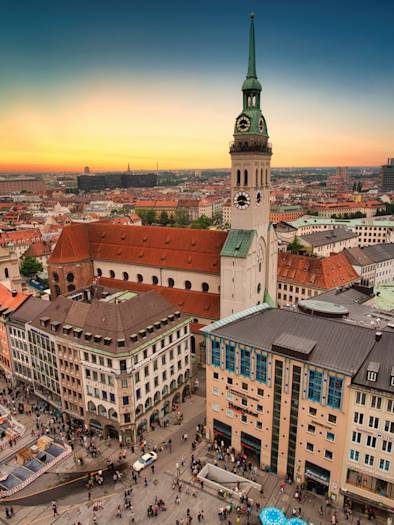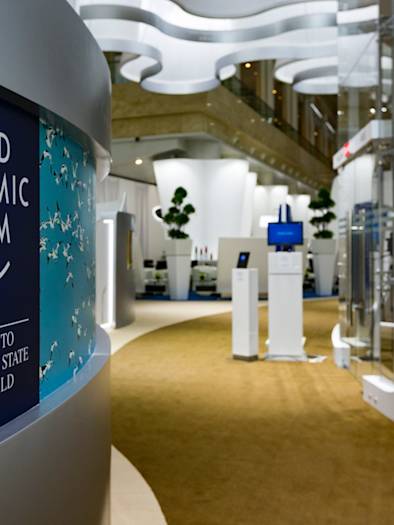
Communication and Today’s Seismic Transformations: Our Time to Lead
On October 11, 2023, AnnaMaria DeSalva delivered the keynote address to international industry leaders and communications experts representing more than 20 countries at the 2023 International Communications Consultancy Organization (ICCO) Global Summit held in Warsaw, Poland.
The following remarks were shared by AnnaMaria DeSalva to delegates on the opening day of the summit.
Thank you, Bianca, and good morning, everyone. First, I want to thank Grzegorz for inviting me to speak at this very timely and important conference. He’s put together such a rich program with diverse voices, perspectives and topics. It’s a great program, incredibly relevant, and I know we’ll all benefit greatly from our time together over the next couple of days.
I should also mention, in addition to his leadership of ICCO, Grzegorz is the outstanding head of the Hill+Knowlton business here in Poland, which is on a strong growth path. It’s such an important time for leadership by communicators, so I want to thank him – and the entire H+K team here – for their innovation and achievement.
Speaking of leadership, it’s an honor to follow Adrian Monck on the podium. Adrian is obviously a very insightful commentator, and I agree with him that the intersection of geopolitics and technology is a defining dynamic of our time. I spent last week in Washington DC at two separate gatherings of Fortune 500 CEOs, and this same discussion dominated those meetings. It’s great that we have been able to benefit from all that Adrian and the World Economic Forum have done to help leaders better understand and manage through the seismic shifts of our age.
Yesterday, when I arrived in Warsaw, I felt immediately inspired to be here.
It means a lot to me to be here, and I would like to tell you why.
When I was growing up, my worldview was shaped by the major transformative events unfolding in Poland, and ultimately in the region. To the eyes of an American child, the march toward freedom that took place in the 1980s was remarkably vivid.
I could see that it flowed from basic human rights and values, which could not be suppressed.
I could see ordinary people become courageous leaders.
And I saw world leaders, known champions of liberty and democracy, become ever more gifted communicators. Their gift of communication was so pronounced, it illuminated change and transformation as the only path forward.
The people, the leaders, their voices – they made it all very clear – and seemingly before my eyes, the reform movement that began in Poland ended communism in East Central Europe.
Four decades later, Poland is a vibrant center of innovation, growth and possibility.
It’s also grappling with one of the most serious security and humanitarian challenges in recent history. Russia’s brutal attack on neighboring Ukraine has united millions of people around the world once again behind the shared values of democracy, freedom, and the rule of law.
In this context, Poland’s geostrategic importance is evident. Just last week, the Warsaw Security Forum met here to determine how to strengthen regional, European and transatlantic security. Poland has become the important linchpin of regional security, taking the initiative to shape military assistance and defense strategy as a critical member of NATO and the coalition helping Ukraine. As importantly, Poland is also shouldering the lion’s share of humanitarian relief efforts related to the war.
As I consider the arc of this history in my own lifetime – from the early 80s of the last century to the early 20s of this century – Poland embodies the full spectrum of experience spanning transformational change. That includes the crucibles – or those moments that test you beyond measure – and the mandates of leadership required of anyone who wants to build a better future.
That’s who I became, all those years ago, and under the influence of inspiring world events that began here in Poland. A young person who wanted to find my gift to help build a better future.
My choice to dedicate my professional life to strategic communication has exceeded the expectations I had to find and apply my gift.
I certainly had high hopes when I was starting out. But I could not have predicted that my career in communication would bring me deep into the worlds of medicine, agriculture, material science, quantum physics, global supply chain management. And now, in my current role, into the realm of creative advisory for nearly every industry, in nearly every corner of the globe.
Like many of you, I’ve learned across my career that the effort to form communication strategy often illuminates the contours of an effective business strategy. And that through our work as communicators, we can often help light the path for greater innovation, better decisions, more creative and durable solutions, and more effective leadership.
Perhaps that’s why I also learned I could play a larger role in management and governance – and in creating better futures for people and communities – than I had even imagined possible.
That experience gives me the confidence and the certainty to say to you today what you might already know in your hearts to be true.
Our work has never mattered more – and now it’s now time for us to lead.
Today, across industries and management disciplines, we’re seeing a coalescing around certain big transformational ideas that are rewriting the rules for the way businesses – and even the economy as a whole – operate.
We just heard from Adrian about the far-reaching implications of AI, a frontier we are just beginning to cross. other sectors are on the threshold of seismic change as well, largely driven by new technology. Biomedicine, healthcare delivery, renewable energy, climate technology, transportation come immediately to mind, but there are others as well.
It’s important to stress that these radical transformations won’t be driven by cautious incremental thinking – they have been ignited by big ideas and bold new approaches and platforms that shattered assumptions and reset parameters.
No doubt, communicators will play a large role in successfully landing these transformations. But the world today also requires us to innovate and lead in several territories, where we are the principal. Where a lack of leadership from us will leave a vacuum that is at best awkward to fill, and at worst, deeply consequential.
What are the critical territories where we as communicators must transform solutions and outcomes? I’d like to offer a short framework to stimulate your further thoughts.
First, there’s risk and creativity. Every day, we witness the power of ideas to create breakthroughs, elevate stakeholders and achieve more than previously thought possible. This has been happening for some time, but what’s new is the scope and intensity of the creative process – it’s getting bigger, better, deeper, more profound and more interdisciplinary.
We need these powerful new ideas to help us address today’s ongoing and emerging risks. By every measure, global risk is intensifying and coming from an ever-widening array of sources. Tragically, it includes armed conflict, as we see in Ukraine and, more recently, in Israel.
Apart from the real human cost of war and significant disruptions, the shifting geopolitical order places an often-conflicting set of expectations on companies from myriad stakeholders. In countries and companies that perceive greater exposure to geopolitical risk, new governance frameworks are emerging to ensure economic security.
Today’s risk domains – in the areas of reputation, disinformation and geopolitics – demand focused intelligence, creativity, and stakeholder-centricity – attributes that lie at the heart of the communication function. As leaders, we can help ensure that the ‘tone at the top’ supports the active exploration of risk and we can widen the aperture for creative solutions. Some of the world’s best business leaders lean into risk with their management teams and boards not just because they are compelled to, but because the urgency can spark bolder thinking.
Risk and reinvention go hand in hand. The equivalent of years of innovation occurred in the space of months during the worst of the pandemic. Seismic change is possible, when we convert risk to opportunity.
This intersection of risk and opportunity, innovation and transformation is an important, exciting focus for today’s corporate affairs leaders and communicators.
Second, disinformation and polarization.
We live in a time of distrust and division that permeates relations between countries as well as within them. When the EurasiaGroup published the leading sources of global risks in 2023, Russia and China were in the top 10, but so was the United States for the deepening political and social divisions that contribute to the risk of instability. And polarization, unfortunately, is not a US-only problem.
The spread of harmful narratives in the form of disinformation is also growing exponentially, casting a long shadow on society and enterprise. Generative AI is also accelerating the problem, making the threat much easier to scale and harder to detect. We see that our clients still need solutions that integrate a more comprehensive set of sources, leveraging ai to analyze for risk in a much more predictive way. We believe that unless our clients can address disinformation at scale, they are at ongoing risk for material disruption.
Communicators can and should play a vital role in combatting disinformation and polarization, which feed off each other, and are synergistic. It’s essential to ensure successful enterprise going forward, but also to preserve democracy.
Third, disruptive innovation. To use a surfing metaphor, the role of communication is not just to ride the wave of seismic change and stay on top of it as it surges ahead, but to mitigate the riptides, the undercurrents, and the inevitable moment of impact.
The word “disruptive” has two meanings, one positive and one negative. As the AI example so brilliantly shows, disruptive innovation brings with it so many extraordinary benefits for society. But it spawns significant risks and dislocations, as well. Using our unique perspectives and skills as communicators, our job is to ensure that disruptive innovation lands as a net gain for humanity – and that the engine of innovation remains vibrant and healthy.
Fourth, inclusive long-term value creation. In recent years – as part of the increasing polarization trend – the debate over shareholder versus stakeholder capitalism has grown more acrimonious. The US Business Roundtable’s statement on the “purpose of a corporation” became something of a lightning rod, and since then many voices have added heat to the conversation. ESG in particular has become a target for those who believe the pendulum has swung too far in the direction of stakeholder capitalism.
I don’t think this debate has really helped either business or stakeholders. We really should be focused on creating inclusive, long-term value that engages and benefits everyone – shareholders, employees, and society broadly. Our role as communicators is to seek out this balance and keep the focus on the constructive cycle of long-term, sustainable value creation. This reset of the tone and content of this debate is essential to ensure the longevity and health of the free markets that enable innovation.
Fifth and last, we have the leadership imperative. As communicators, we help leaders lead. We help them find their voice, deepen their influence and chart their success. In times of transformational change, the leadership imperative assumes even greater primacy.
As business leaders navigate today’s substantial risks and opportunities, they need senior communicators as full-fledged strategic partners. Not as observers and coaches, but as principals in the arena — trusted partners on the field who can see the patterns, make the calls, ignite performance, and ensure success. We have a massive role to play in ensuring effective leadership through the transformations of this decade.
These are five territories in which we must innovate and lead in 2023 and beyond. There are others. I hope you will think of many more.
This is a critical path we are on, as leaders and innovators solving today’s grand challenges. It should inspire us to take a fresh look at our profession and our places in it – and what we need to grow in stature, influence, impact.
As communicators, we have urged our leaders to be bold; now we have to be bold ourselves.We have made the case for our organizations to embrace big ideas; today we need to generate transformational ideas.
As communicators, we need to embody the idea that transformation is always possible – even in seemingly the most intractable situations. It’s never too late, too hard, too far gone. It’s always possible. Communication, connection, communion between people and ideas – that’s what converts these moments.
I’m reminded of one such moment that took place a year ago.
It was September 2022. President Zelensky joined a group of business leaders, myself included, by video link to ring the opening bell of the New York stock exchange. He used the occasion to announce an exciting new investment initiative, called Advantage Ukraine – a platform of more than 500 projects worth $400 billion for foreign companies and private investors to help rebuild Ukraine’s economy.
“Ukraine is the story of a future victory and a chance for you to invest now in projects worth hundreds of billions of dollars to share the victory with us,” he said. A banner nearby read, “We are free. We are strong. We are open for business.”
I’m proud that WPP and Hill+Knowlton were among the first companies to partner with Advantage Ukraine and commit to being part of that country’s economic future. That day at the exchange, as I listened to a wartime leader describe his active plan for a prosperous and free Ukraine, I thought to myself, that’s extraordinary…that’s leadership.
In times of crisis and dramatic change, successful leaders use communication to reinforce deeply held values and promote their vision of a better world. They rally people to shake off fear and believe in themselves. As we’ve seen in Ukraine and Poland, leaders can be true heroes, building resilience and channeling their hope and vision into a blueprint for positive change.
Today’s world requires that we directly join the ranks of those leaders, to deliver solutions to very modern problems, to prevent dislocations, to protect our values and our institutions, and to make the most of innovation. Perhaps no other profession can do what we do – manage change, get ahead of it, understand it, explain it, and prepare for the next waves of it, which inevitably will come.
This is our time as communication leaders to be catalysts of transformative change. Let’s work together to change the trajectory of the risks that threaten us. Let’s deliver on the potential of the opportunities that transport us.
We have a massive role and potentially a heroic legacy. I believe it will be a brilliant one.
Thank you.







